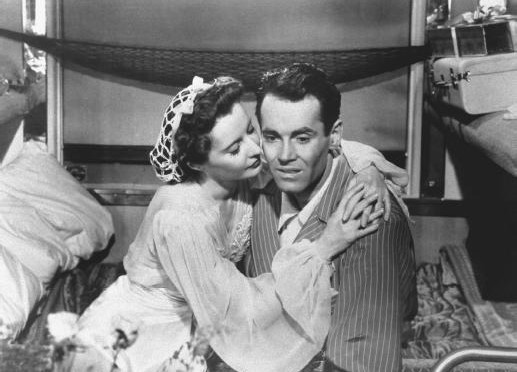Regardless of women being “liberated” during the time of World War Two, when men were forced to “allow” them to do “masculine” tasks like work with industrial products and play baseball, it didn’t mar the blatant sexual prejudice against the so-called fairer gender that pervaded this part of the twentieth century.
A prime example of this is Preston Sturges’ 1941 classic screwball comedy, The Lady Eve, a play on the original Eve and the main character’s, Jean Harrington (Barbara Stanwyck), alter ego when she carries out a vengeful con on her mark, Charles Pike (Henry Fonda). After ophiologist/heir to the Pike Ale fortune Charles spends a year in the Amazon researching snakes, news of his late arrival to the cruise ship S.S. Southern Queen spreads like wild fire to the passengers, among them Jean and her father, “Colonel” Harrington (Charles Coburn), both professional card sharps who have been at the swindling game for years–and have the rote sense of self-confidence to prove it. At first perplexed by Charles’ aloof attitude toward all the women salivating over him in the dining area, Jean assesses the best way to take charge by tripping him and then blaming him for breaking the heel of her shoe and insisting that he come down to her room to personally replace it.
While every other woman failed at attracting his attention, Charles is instantly taken by Jean–in large part because of her perfume, a pheromone-packed potion Charles forgot had existed during his time in the jungle. Knowing she has him wrapped around her finger, Jean leads him into a game of cards with her father almost right away, during which they both lull him into a false sense of security by deliberately losing 600 dollars to him. All the while, his longtime “keeper,” of sorts, Muggsy (William Demarest), suspects the duo of foul play, to which Charles automatically balks, already too in love to see anything but good in Jean, who has further captivated him by calling him his childhood nickname, Hopsie.
Everything goes according to Jean’s plan, except the part where she ends up falling in love with him. Ready to give up her life as a con woman and confess her true identity after Charles proposes, her father urges her to wait until they dock in New York so as not to incriminate him or his other partner in crime, Gerald (Melville Cooper). Willing to make this concession out of loyalty to her dad, she holds off, a grave mistake that gives Muggsy time to find the dirt on her in the form of a file the ship’s captain has on the Harringtons, tipping Charles off to her trickery. When he refuses to forgive her–throwing further salt in the wound by inferring he has no faith in her claim that she was planning to be forthcoming with him–Jean reverts to her old ways tenfold, seeking out vengeance first by applauding her father for not actually ripping up the $32,000 check he “won” from Charles the previous evening.
But mere monetary thievery isn’t enough to satiate Jean, who seizes the opportunity to further toy with Charles when a fellow con artist of hers, “Sir” Alfred McGlennan Keith (Eric Blore), tells her how he’s been encountering the Pikes on their estate in Connecticut. Salivating over the prospects of what she could do to him, Jean asks Alfred to let her pose as his niece so that she can make a cameo at one of the Pike’s dinner parties. When she shows up under the guise of “Lady Eve Sidwich,” Charles is so flabbergasted by her resemblance to Jean that he trips on a large couch right in front of him, the first in a series of klutz-tinged events. Muggsy, of course, insists that it’s “the same dame.” But, by Charles’ logic, Jean would never be bold enough to come near him without at least better disguising herself. This self-deception, paired with a soap operatic story about long lost sisters told by “Sir” Alfred, cinches “Lady Eve’s” credibility as a separate woman from Jean.
From there, Charles follows the same pattern, even delivering the same yarn about how he’s “known [her] always.” This cuts Jean even deeper, solidifying her resolve to let him marry her and then give him the worst surprise of his life–a surprise telling of what makes men tick, what off-puts them to no end: sluttery. By “unwittingly” admitting to having eloped at age sixteen while on their honeymoon, “Lady Eve” continues down the path of made up confession by providing a laundry list of other men who have “had” her, from Angus all the way to John. So bristled and disgusted by the notion of her being with anyone else, let alone so many others, to boot, Charles separates from her on the spot, leaving from the train they’re on in a disgruntled hurry. Jean, feeling guilty about playing with his mind, insists–as Eve–that she wants no settlement money from the divorce, just to talk to Charles in person. But when Charles’ father informs her that he refuses to talk to her and is taking a boat back to the Amazon, Jean panics and arranges to be on the same ship. Rather than being angry at her when she cleverly makes her presence known to him, he is relieved to find her again. She suddenly looks like the pinnacle of virtue in comparison to “Eve.” For you see, a con artist is preferable to a slut–both then and now.






















